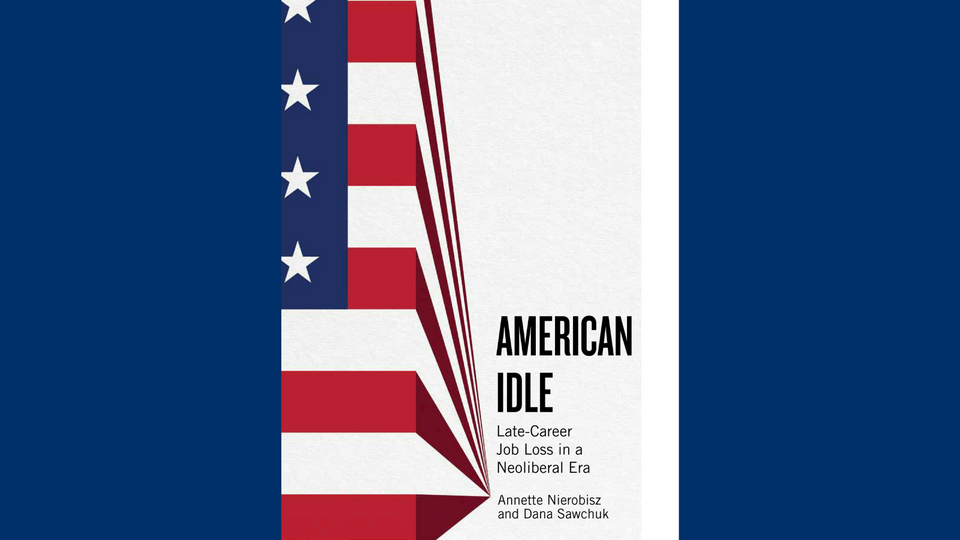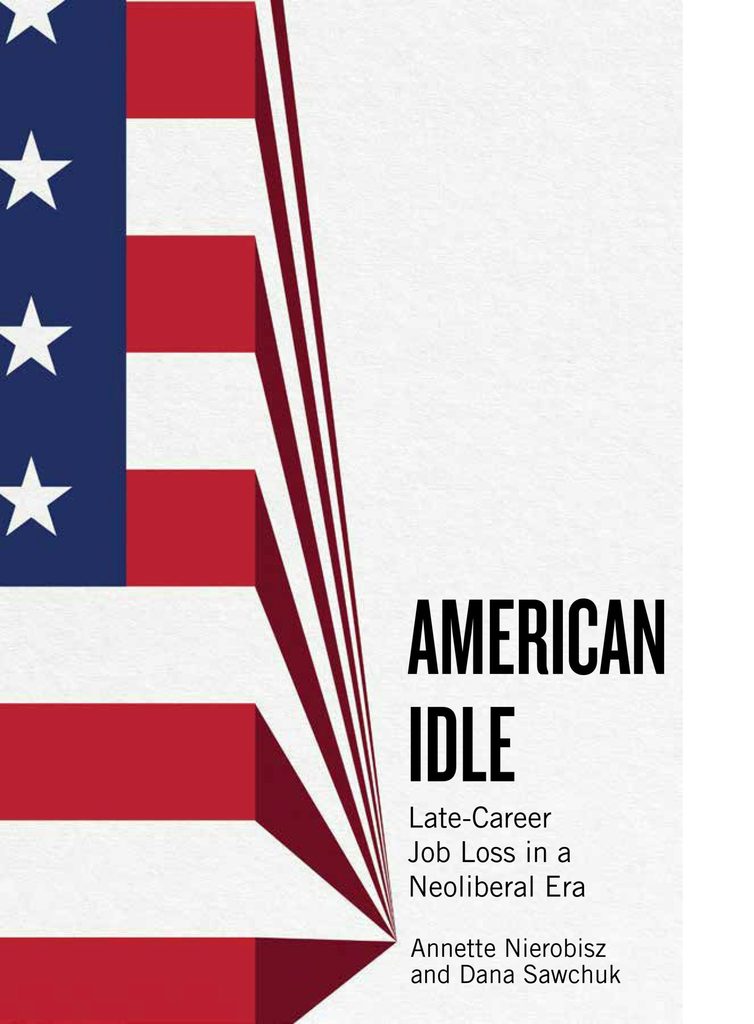Q&A with Annette Nierobisz and Dana Sawchuk, authors of American Idle
Nierobisz is Ada M. Harrison Distinguished Teaching Professor of the Social Sciences and professor of sociology at Carleton. Sawchuk is professor and chair of the Department of Sociology at Wilfrid Laurier University in Canada.

In American Idle: Late-Career Job Loss in a Neoliberal Era, Annette Nierobisz (Ada M. Harrison Distinguished Teaching Professor of the Social Sciences and professor of sociology at Carleton College) and Dana Sawchuk (professor and chair of the Department of Sociology at Wilfrid Laurier University in Canada) report their findings from interviews with 62 mostly white-collar workers who experienced late-career job loss in the wake of the Great Recession.

Without the benefits of planned retirement or time horizons favorable to recouping their losses, these employees experience an array of outcomes, from hard falls to soft landings. Notably, the authors find that when reflecting on the effects of job loss, fruitless job searches, and the overall experience of unemployment, participants regularly called on the frameworks instilled by neoliberalism. Invoking neoliberal rhetoric, these older Americans deferred to businesses’ need to prioritize bottom lines, accepted the shift toward precarious employment, or highlighted the importance of taking initiative and maintaining a positive mindset in the face of structural obstacles. Even so, participants also recognized the incompatibility between neoliberalism’s “one-size-fits-all” solutions and their own situations; this disconnect led them to consider their experiences through competing frameworks and to voice resistance to aspects of neoliberal capitalism.
Employing a life course sociology perspective to explore older workers’ precarity in an age of rising economic insecurity, Nierobisz and Sawchuk shed light on a new wrinkle in American aging.
American Idle is published by Rutgers University Press.
What inspired you to write this book?

In 2011, Annette was out on a walk when she bumped into a neighbor. He confided that he had recently experienced a phenomenon that was rife in the daily media at the time: late-career job loss. What he shared cast light on the lived reality of an unemployed older worker, yet his story contradicted the overly simplistic doom-and-gloom media accounts. Reflecting on this exchange, Annette developed a research study that asked the question, “What happens to workers who lose their jobs after age 50?”
In American Idle: Late-Career Job Loss in a Neoliberal Economy, we tackle this question by interviewing 62 older, white-collar workers who experienced job loss in the volatile economy of the Great Recession. The book taps into the voices of people who, as one interviewee put it, found themselves at a troubling new stage of the American life course: “too young to retire but too old to start all over.”
How did the two of you start writing together? What do you each bring to this project?

We’re actually old college friends! We first met in a senior sociology class in Winnipeg, Canada in the late 1980s and hit it off immediately. After graduating, we went our separate ways for a while and then, by complete coincidence, discovered that we were both pursuing PhDs in different departments at the University of Toronto in the mid-late 1990s. Unbeknownst to us, we were even living only one subway stop away from one another in the city! We always kept in touch after that, even when we landed faculty positions on the opposite sides of the Canada/U.S. border. This is actually our first joint project — and we’ve wondered why we didn’t start to collaborate much sooner in our careers.
This book has been a long-term passion project of Annette’s. She developed the study and conducted all the interviews. The project builds on her long standing interest in workplace issues and previously published research on job loss in economic recessions, while also drawing on her expertise in qualitative data analysis.
Dana joined the project after a curious finding emerged at the data analysis stage: nearly three-quarters of the interviewees referenced God, faith, and church in describing how they coped with their job losses. Dana’s expertise in the sociology of aging, combined with her social scientific understanding of religion and identity, brought clarity to this finding. Our collaboration blossomed into a journal article, “Religious Coping Among Older, Unemployed Workers: Narratives of the Job-Loss Experience,” and from that point on, Dana became a partner in the larger project.
What did you learn about the subjects you spoke to and how did that change your thinking about the impact of job loss?
One of the biggest takeaways from the project has been how this group of baby boomer workers, because of when they were born and their experiences over time, really straddles two distinct employment eras in American history. And then, how that unique demographic and life course location shaped their responses to their job losses after 2008.
Our respondents grew up and saw their parents experiencing the stability of life-long careers of mutual obligation between employer and employee, complete with benefits and the party with a cake and a gold watch at the end of their working lives and the beginning of comfortable retirements. So when, as White and well-educated individuals, they entered the labor force themselves, they fully expected to experience this same type of stability. For a while, and for the most part, they did. Later in their careers, however, and certainly when the 2008 Great Recession hit, we were already well into the period of what we call in the book the “neoliberal era.” This era, for a variety of reasons, really is not characterized by the same type of mutual obligation between employer and employee, but this was the rough new reality that confronted them when they lost their jobs.
So, what really changed our thinking about job loss was not necessarily how hard it was for our respondents or the financial and emotional strains they reported (this was sad, but not really unexpected). Rather, it was how living through this shift, from the age of stability that they saw in their parents’ generation and that they were socialized into as young workers, to the neoliberal age (sometimes called the age of flexibility), really shaped their expectations about employment and opinions about job loss. When they talked to Annette, we saw both evidence of a nostalgia for that bygone era of stability, but also evidence that they had internalized, for better or worse, much of the mindset of the new neoliberal era.
What surprised you the most in this project?
One of the biggest surprises for us was the variation in financial outcomes following job loss. At one end of the spectrum were those interviewees who experienced a “hard fall.” Long-term unemployment, multiple job losses, evaporating personal wealth, and difficulty paying for basic necessities were among the troubles these downwardly mobile individuals faced. Interestingly, it was the women in our sample who were more likely to report this devastating financial outcome. Equivalent hardships were absent from the job loss experiences we classified as “soft landings.” These predominantly male respondents were left more or less financially unscathed. And then a third group fell somewhere in between on the hard falls/soft landings continuum. These individuals still had a bumpy ride, but they tended to have personal resources in place that insulated them from a hard fall after job loss.
Another surprising finding was how long these variations in job loss outcomes lasted. When we recontacted our interviewees a decade later, those with hard falls were continuing to experience financial difficulties while those with soft landings were enjoying a comfortable retirement. In sociology, we refer to this phenomenon as “cumulative disadvantage,” which simply means that social or economic benefits accumulated earlier in life add up over time, eventually leading to larger disparities between advantaged and disadvantaged groups.
How can the lessons learned from the Great Recession inform how policymakers should prepare for the coming disruption from AI?
One of the things we say in the book is that “objects in the mirror are closer than they appear,” and we think that’s a good way of putting it. We’re more than 10 years away from the first job losses some of our respondents experienced — even 15 years in some cases — though we did re-interview six of the original respondents in our book in 2023. And really, what we learned from all of our interviewees and the lessons from their experiences are unfortunately all too relevant today. Not just because the population is aging and people often work past the traditional retirement age. Whether it is because of AI, DOGE cuts, or COVID-19 before that, job loss among older white-collar workers is a common phenomenon. It’s so common, in fact, that sociologist Sarah Damaske likens it to an institution in American society. We need to understand it to be better prepared for the future.
We also learned that job clubs offered our respondents an important lifeline. At the time of our study, there were approximately 90 community and faith-based job clubs operating in Minnesota’s greater Twin Cities region. The three most popular clubs were affiliated with Christian churches that offered job search services. In the book, we are critical of privileging a faith-based framing of job loss while downplaying contemporary business practices and ideologies that informed both downsizing and job search strategies. Research by sociologist Ofer Sharone shows that when job counselors take a sociologically-informed approach, they can greatly reduce the stigma that unemployed white-collar workers inevitably experience.
Beyond this critique, many of our respondents spoke positively about the invaluable assistance and camaraderie they experienced at job clubs. When we reconnected with one respondent a decade later, he had moved to a different state, one where these clubs were non-existent. This made his unemployment experience feel even lonelier and more difficult than necessary.
What role did additional skills training or career pivots play in people moving forward after job loss?
One respondent talked about accepting contract opportunities as a way to expand his skillset and enhance his market value. Other respondents enhanced their credentials by enrolling in educational programs. While these self-investment efforts boosted confidence, they did not produce new full-time jobs. Part of what was going on was the ageism that our respondents encountered. Consistent with what we see in the scholarly literature, stereotypes and false assumptions about older workers proved a real obstacle for many of our interviewees. Let’s face it, high school and college graduation dates and other clues in a resume can easily reveal an applicant’s age after the simplest of calculations, and callbacks and interviews sometimes dried up after such a calculation was made. In response, our respondents engaged in various forms of body and beauty work — dying gray hair, dressing “younger,” losing weight, acting “energetic and enthusiastic” in interviews to convey vitality, and, in one case, even concealing the fact that a wheelchair was sometimes needed as a mobility aid.
Some of our respondents chose to reinvent themselves after job loss. These self-actualization efforts included embracing part-time work and a mindset of “work to live” rather than “live to work.” Others explored new career paths, and often self-employment, that allowed them to center their creativity and personal interests. While these paths typically resulted in a loss of occupational status and income, the happiness our respondents reported experiencing was perceived as worth the payoff.
What would you most want your audience to know and understand after reading this book?
On the one hand, we saw how people’s age and life stage really shaped their unemployment experiences. But on the other hand, we want to convey how generalizations about the baby boomers are both inaccurate and unwarranted. There’s a tendency to blame baby boomers for climate change and to perceive this generational group as having achieved greater wealth and financial security than the generations that followed. They’re the lucky ones, right? Yet, our study illuminates some of the many financial struggles they encountered. These people don’t have the luxuries that tend to be associated with the boomers. Some scholars call these false generalizations “generationalism,” and we refer in the book to the generational “blame game,” which is not only wrong-headed but also divisive. And it goes both ways, as we also heard our interviewees saying some rather unflattering things about “kids these days” — that they are not loyal to their employers or that they are not willing to work hard, for example. But here’s the thing: both demographic groups are shaped by the historical context in which they entered into the labor force, and both groups need to look beyond this age-based blame game to truly understand the broader policies and priorities of companies and governments themselves who render all age groups precariously employed in the neoliberal era.
What questions still remain unanswered that you think should be addressed?
Let’s face it, we interviewed a highly select group of respondents: White, mostly white-collar workers. We did follow conventional sampling methods, and sent out a multi-pronged call for research participants, but, despite claiming a mix of ethnic backgrounds, all of the respondents self-identified as White.
We believe future research needs to determine if the problem of late-career job loss is concentrated among white-collar workers and, assuming it’s not, access the experiences of more diverse occupational groups. Also, because social research confirms that racialized workers tend to experience a far greater range of disadvantages in the workforce, future research should focus on the job loss experiences of older workers who are racially diverse. Finally, the state-level supports unemployed workers could access in Minnesota at the time of our study were more generous than other states. For this reason, it’s necessary to qualitatively document the job loss experiences of older workers in a wider range of geographic regions.
Looking forward more broadly, there are some questions that future researchers and policy makers should examine. For example, some of our respondents discussed the financial support they received from their parents. What happens when these parents die and a once reliable income stream disappears? Where will older generations find financial support, especially if they don’t have adult children who can close the gap? Additionally, some of our interviewees leveraged their homes to manage the unemployment experience. With the classic middle-class nest egg of home ownership now seen as unattainable to younger generations, they may not have the leeway that buffered many of our “soft fall” respondents. Finally, the onset of AI is projected to result in millions of job losses for white-collar workers. Will this create a significant shift to employment in manual labor? If so, these physically demanding jobs will neither be attractive to, nor feasible options for, older, unemployed white-collar workers.
Learn more about American Idle: Late-Career Job Loss in a Neoliberal Era.